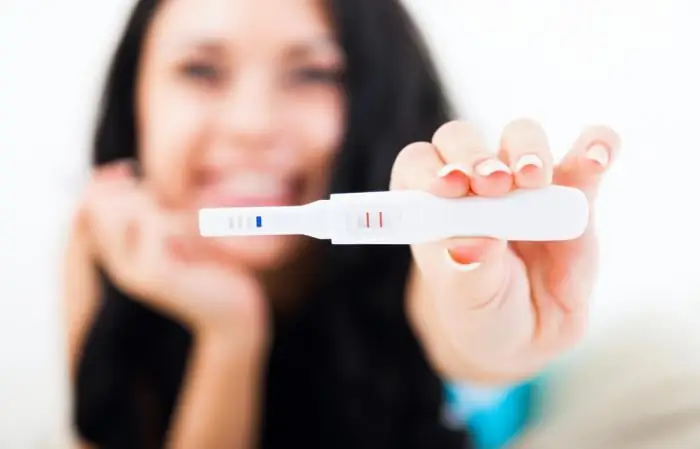2026 Author: Priscilla Miln | miln@babymagazinclub.com. Last modified: 2025-01-22 17:55:13
While the baby was in the stomach, all the necessary substances came to him thanks to the umbilical cord. But having been born, the child for the first months feeds only on breast milk, which must be tasty and saturate the small body with all the necessary elements. Therefore, the nutrition of the mother is the nutrition of the baby. Hence the question arises - what should a nursing mother not eat?
Adaptation of digestion
Already 10 hours after birth, active processes begin in the intestines - useful microorganisms settle there to help the good functioning of digestion. But still, the first months are very difficult, primarily because the flora of the gastrointestinal tract is being formed. It is this process that gives the baby a lot of pain, anxiety. Especially intensified discomfort in the evening. The baby then notifies the parents by crying that he is very ill. Abdominal pain usually resolves by three months.

But while the children's stomach is so delicate that complexhe is not able to digest the components. That is why a nursing woman needs to monitor her own diet, mainly eating diet foods. Breast milk contains substances that aid in good digestion through enzymes and bifidus factor, which support beneficial intestinal microflora. This is why breastfeeding is so important. It protects the child from dysbacteriosis, pathologies of the digestive system, allergies and other diseases.
Does mom need to change her diet
The first time after giving birth, the menu should not differ in a wide variety and wide choice. These are mostly light meals, such as no-fried vegetable soup, kefir, gluten-free cereals, and baked apples. This restriction is caused by fears:
- The possibility of an allergic reaction to any component in the baby.
- Difficulty digesting complex ingredients.
Raw vegetables and fruits - that's what a nursing mother should not eat in the first postpartum month because of the colic that then occurs in the baby. Of particular danger are also those vegetables or fruits that were grown in greenhouse conditions, since they probably contain a large amount of nitrates. It will be necessary to introduce them into the diet gradually, in small portions, observing the behavior of the baby. Since the child may have an individual intolerance to a particular product.
It is difficult for a woman during this period - she and the baby need useful substances, so they are required in an increased volume. And you can get them only through a balanced diet. Butat the same time, there are restrictions on the menu, and what will benefit during this period, and what will harm - that's what worries a nursing woman. But it's not all that confusing.
What determines the production of breast milk?
Lactation does not depend on a woman's diet. Breast milk appears due to the work of the hormonal system, namely prolactin and oxytocin, and milk is produced from elements taken from blood plasma. Because of this, nutrition affects lactation by only slightly changing the content of any substances.

So, even with a very limited diet, the baby will receive the proper amount of milk along with nutrients. This is how nature took care: to give the growing body from the mother everything that is required for development and he alth. Therefore, breast milk has everything necessary and beneficial for the he alth of the baby.
But still, you need to think about nutrition and, above all, know what a nursing mother should not eat.
Bad Drinks
Dietitians, pediatricians can sometimes disagree on a certain product that is not allowed during the lactation period, but they agree on one thing - alcoholic beverages, even weak ones, are strictly prohibited.
The derivative component of alcoholic beverages - ethanol - spreads very quickly, destroying the body. It also enters the mammary glands, and in very high concentrations. And once in the children's body, first of all, it negatively affects the liver, which is not yet sufficiently developed and is not ready for such loads. If aa nursing mother systematically drinks alcoholic beverages even in small doses, this addiction leads to the following consequences for her child:
- both physical and mental development is delayed;
- nervous disorders occur that can lead to dementia;
- heart and brain vessels are affected;
- begins intoxication of the whole organism, as alcohol is very slowly excreted.
It has been observed that drinking even beer leads to a decrease in the amount of breast milk.
Can I drink carbonated drinks while lactating?
Drinking carbonated drinks, as well as alcoholic drinks, is not recommended. The ban on them is quite justified, since most contain a large amount of caffeine, and it acts too excitingly for the fragile children's nervous system. It also contains carbon monoxide, which can irritate the esophagus. And the high sugar content for a woman is fraught with the threat of gaining extra pounds.
Strong tea or coffee has an exciting effect on the baby, a drink such as cocoa will be a big load on the heart muscle. Juices are not recommended at this time, it is better to replace them with compotes.

Foods that won't benefit your baby
Sausages and sausages - that's what a nursing mother should not eat, especially in the first months after the birth of a baby. Too often, various flavorings and dyes are put into such meat products to improve the taste, as well as preservatives that are hazardous to he alth. In addition, these products are fatty and spicy. All these ingredients give a very big load not only on the children's stomach, but also on the pancreas.
For the same reason, any chips should be excluded from the diet. They necessarily contain aromatic additives and artificial ingredients that can poison the children's body for a long time. This product is also high in fat.
Dangerous sauces
Homemade sauces are safe as they are made from natural ingredients. But store-bought during lactation, you should try to completely exclude.
For example, in ketchup, which looks very appetizing on the counter of the store, modified starch and preservatives, vinegar and pepper, harmful to the baby's stomach, are actually hidden.
Mayonnaise is also not recommended for a nursing mother. It is digested very slowly, contains mainly a lot of preservatives and harmful additives. It is considered a very high-calorie product.
Effect of nuts on breast milk production
Every mother wants the baby to eat hearty and delicious food, but in the first months, except for breast milk, she cannot give him anything appetizing and he althy. Therefore, she tries to eat foods that will benefit the crumbs. For example, women try to include nuts in their diet, as it is believed that they add fat to milk and at the same time increase lactation. But this is the wrong opinion.

Fat cannot increase from nuts, it can only change the composition of fats in breast milk, and this will lead tothe fact that the milk will change its consistency - it will become viscous, and it will be more difficult for the child to get his own food. Therefore, it is better to consider that a nursing mother should not eat nuts so that the baby does not experience difficulties during the next saturation.
Mushrooms - is it possible or not?
Mushrooms during lactation are also included in the list of what should not be eaten by nursing mothers. This product belongs to the category of heavy food and still contains a very large amount of vinegar if the mushrooms were pickled or s alted. Vinegar has a detrimental effect on the mucous membrane of the baby's gastrointestinal tract.
By the way, even homemade canned mushrooms are not recommended for nursing mothers. Since when collecting on the mushroom, the causative agent of botulism could get from the soil. In the absence of oxygen in the jar, it feels very comfortable, so it develops rapidly, and, which is especially dangerous, forms the strongest toxin. The consequences of such poisoning are:
- severe headache and dizziness;
- visual impairment;
- difficulty moving;
- dry mouth.
Children under 5 years of age are not recommended to eat mushrooms, even if they are in dishes as a filling, since the children's body does not yet have enough necessary enzymes to digest them.
What else should be eliminated from the diet?
To the list of foods not allowed for a nursing mother, you need to add various seafood, which primarily includes mussels, shrimp, crab sticks and squid. And all because they can be strong enoughallergens.
There are a number of products that contribute to increased gas formation. They include:
- grapes;
- black breads;
- cabbage;
- cucumbers.
But if the mother does not have such a reaction after eating food, then the child may only rarely experience bloating. But it may also be that the baby becomes lethargic and capricious, he may even vomit. It is dangerous if the food is not digested, but remains in the intestines. For the same reason, it is necessary to exclude from the diet dishes with legumes - beans and peas, lentils, as it can provoke severe colic in the baby.
Diarrhea can also occur if the mother could not resist and ate fresh apples or pears. They are high in fiber, and this substance speeds up the bowels.
Restriction of fruits and vegetables
Doctors do not advise during breastfeeding to eat primarily fruits and vegetables that are red or yellow in color. This color indicates that there is a red pigment here, and it is a dangerous source of allergic reactions.

Fruits brought from distant countries should be treated with caution. Doctors explain why a nursing mother should not eat overseas gifts: they can cause an allergic reaction due to the fact that the body does not perceive some components. Citrus fruits are especially dangerous in this regard.
It is not recommended to eat garlic, onions or spicy plants during lactation, that is, all foods thathave a pronounced taste - spicy, bitter or too rich fragrant, as they can significantly change the taste of milk, and this will be a lot of stress for the child. And chili peppers can even burn the larynx through milk. No wonder if the baby refuses to eat.
Sweet Bans
Chocolate is one of the most beloved sweets, but during breastfeeding, doctors advise to be patient, and if there is an irresistible desire to taste a small slice, then it is better to let it be pure dark chocolate, and not milk, white or with fillers.
Appetizing and delicious buns or cakes, muffins and cookies cause fermentation in the baby's stomach. This means that this type of confectionery will be banned for some time.
Lollipops contain a lot of colors and flavors that can adversely affect the baby's digestive system. For the same reason, it is not recommended to eat marmalade and jelly candy for a nursing mother.
Allergy Prevention
From the recommendations of what a nursing mother should not eat, foods high in protein can be distinguished, as there is a fear that the baby's intestines may react with pain. Therefore, doctors advise including dairy products in the menu - kefir, fermented baked milk or cheese. They also have protein, but slightly modified, but the body perceives it more sparingly.

Porridges that contain gluten - that's what a nursing mother should not eat for the first months in order to avoid allergies in a child. Almost all cerealscontain this protein. The exception is cereals made from buckwheat, rice and corn.
Foods that can adversely affect he alth and lead to allergies include:
- sausage products;
- honey;
- smoked meats;
- wheat flour products;
- soy;
- fish;
- foods that are vacuum-packed;
- chicken eggs.
Protecting the child from the appearance of constipation, you need to remember that you can not eat a nursing mother in the first period after the birth of the baby. These are foods that cause food allergies, because as a result of this pathological process, inflammatory reactions occur in the intestinal walls. In addition, the symptoms of food allergies are difficult to get rid of.
Doctors say that if a woman does not have an allergy to any product, then the baby should not have it either, and therefore the list of what is not allowed for a nursing mother in the first month and subsequent ones can be gradually increased. The main thing is to observe how the child reacted to the new dish.
Conclusion
Although some foreign pediatricians believe that there is no point in a diet for nursing mothers, you should not ignore it. The fact that the child's body reacts to changes in the composition of mother's milk is difficult to dispute. Therefore, at first, it is better to try to limit yourself from harmful and allergenic food.

Usually, by the age of 6 months, a mother can afford an extended menu, as the child's body is quite adapted to the new components. Therefore, the question of what a nursing mother should not eat after childbirth is gradually resolved by itself. And mom's properly composed diet will help the baby gradually learn different foods.
Recommended:
How do they get into nursing homes? How can a pensioner get into a nursing home?

Most pensioners prefer to spend their old age at home, within their walls. However, it happens that an elderly person does not have children or close relatives who can provide proper care. In this case, you just need to know how to get into a nursing home
Menu for nursing mothers for every month

In the menu of a nursing mother, the most key are natural, high-quality (farm, home) and balanced products that are cooked exclusively in a steam, in the oven or in a saucepan. After all, the period of feeding a baby, like pregnancy itself, is the most crucial months in the life of a woman who is expecting a baby. Therefore, this article will help to understand and plan the menu of a nursing woman in the first days and subsequent weeks, months
How to behave during the first weeks of pregnancy. What not to do in the first weeks of pregnancy

In the early stages of pregnancy, you need to pay a lot of attention to he alth. During the first weeks, the tone for the subsequent course of pregnancy is set, therefore, the expectant mother should especially carefully listen to her feelings and take care of herself
What not to eat during pregnancy: food list

Expecting a baby comes with many worries. Often, the expectant mother is worried about what not to eat during pregnancy and what foods will be beneficial for the he alth of the unborn baby. It's time to learn all about proper nutrition during this period
How to increase the fat content of breast milk for a nursing mother?

Breastfeeding is an important milestone in a newborn's development and is worth every effort to breastfeed your baby. However, some unfounded stereotypes that have lived in our country for decades can instill fear and anxiety in a young and inexperienced mother. One of them is about nutrition and how to increase the fat content of breast milk. Let's try to figure out whether its composition can change, what affects it and what fat content it should have

